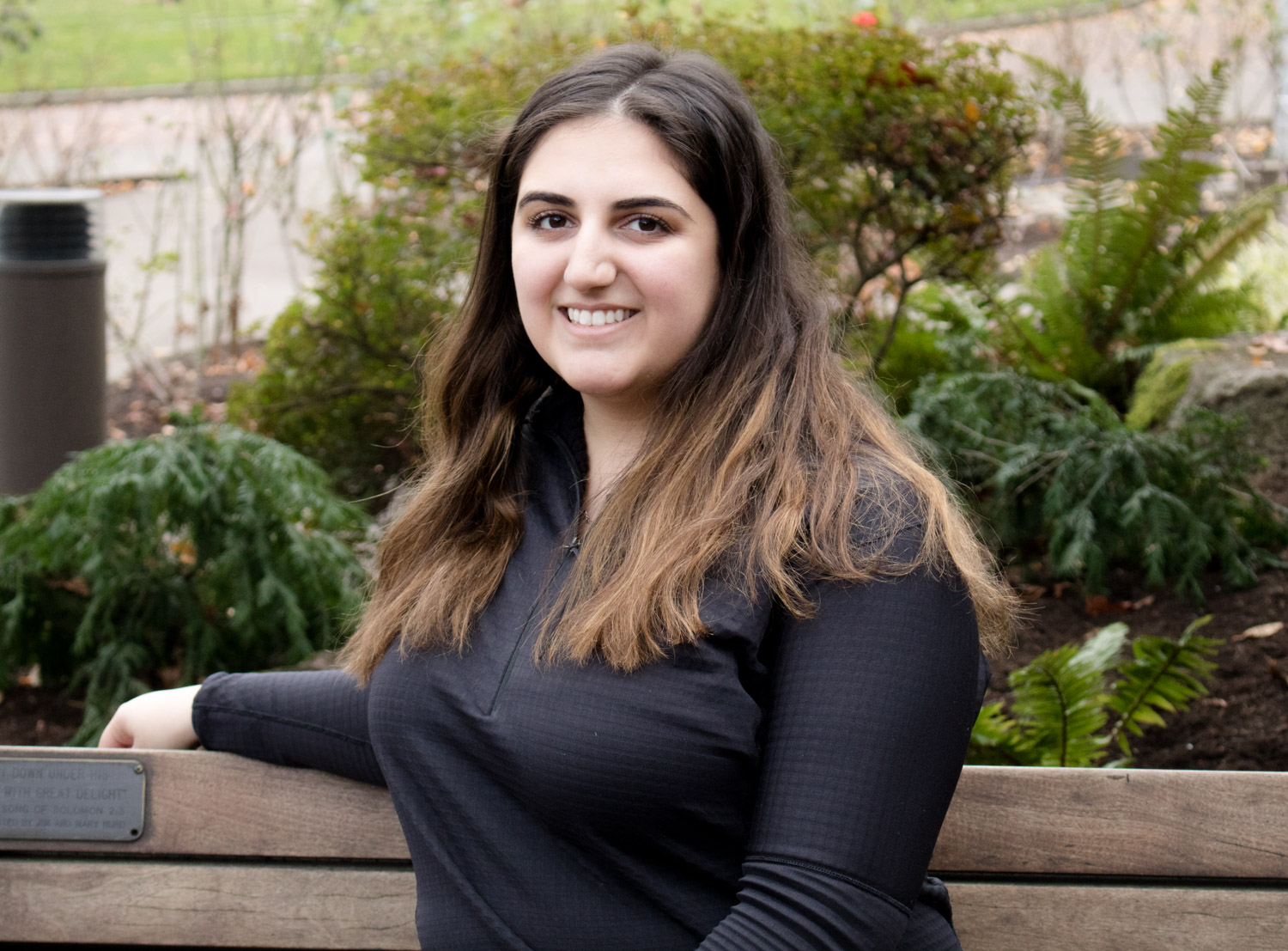Identity in tradition
Celebrating Hanukkah on Christian campus
December 4, 2019

Natalie Goobes shares about the traditions of Hanukkah.
Senior Natalie Goobes walks around Seattle Pacific University’s predominantly Christian campus with a different perspective.
As a Jewish woman, Goobes sees the approaching holiday season in a different light from most of her peers. While most of SPU will be celebrating Christmas, Goobes will be celebrating Hanukkah.
“I have felt different than other people on campus, but I don’t think it has taken me away from Judaism or being Jewish. I still feel free to celebrate Hanukkah,” Goobes said.
Although Goobes is on a campus founded in the Christian faith, which she does not practice, she still finds a way to connect to her identity.
Goobes’ celebration of Hanukkah brings her closer to family, in the process strengthening her identity.
As Goobes sees it, her Jewish identity, and the history that comes with it, is what makes the holiday of Hanukkah sacred.
This year, the upcoming sacred season of Hanukkah spans from Dec. 22 to Dec. 30.
Goobes said that in the second century B.C., the Jewish people were oppressed under King Antiochus, who invaded and destroyed parts of Jerusalem. They were forced to worship Zeus when King Antiochus took over the Jewish Temple.
Then a Jew and his five sons raised up thousands of Syrians to fight Antiochus and won, reclaiming Jerusalem.
Once they won the Temple back, they wanted to celebrate, but most of the sacred oil used for purifying rituals was destroyed in the battle. They had a days worth of oil left but, miraculously, it lasted for eight.
To represent this miracle, the menorah was created.
The nine candles on the menorah represent the eight days that the oil lasted, and the ninth candle is the one used to light the others. One candle is lit each day to represent each of the eight days.
“That is what makes Hanukkah special to me, it’s the celebration of a miracle,” Goobes said.
Acknowledging the history of oppression that the Jewish people have endured and survived is important in celebrating the holiday today.
“The painful history of the Jewish people makes me feel more connected to my Jewish identity because I feel a calling to come together and to build our community,” Goobes said.
That feeling of connection to her Jewish community impacts the way that she appreciates the traditions.
Along with the menorah, another significant tradition is the dreidel. While the dreidel is mostly played with by children, it holds meaning nonetheless.
It was important that the Jewish people still found a way to celebrate their identities even though they were being oppressed.
The dreidel was originally constructed out of clay and used to play Jewish games when the Syrians occupied Jerusalem.
“It was a way to conceal Jewish heritage while under rule,” Goobes said.
To celebrate in the modern day, Goobes gets together with her extended family on the first and last nights of Hanukkah to light the candle, pray, share a meal and exchange gifts.
One of her favorite family memories of Hanukkah is when they all got snowed in at their house in Renton, WA.
“We were kind of forced to spend time together — more than we usually do which was a blessing and a curse. I was really thankful that we had that time to bond together,” Goobes said.
As they were “forced to spend time together,” her family had more of an opportunity to pray together, grow together and reflect on the traditions that they share.
“I think having a faith together as a family is really important and I hope to raise my children with Judaism as an important part of who we are,” Goobes said.
On the nights in between the first and last days of Hanukkah, her immediate family lights the candles and prays together.
“We usually do presents on the first night, which is more of a modern Hanukkah celebration, and then we do just the candle-lighting and prayer on the days between,” Goobes said.
Although the gifts are more of a modern tradition, the dinner has always been a staple.
When they eat dinner as an extended family, Goobes’ favorite traditional foods are latkes and sufganiyot.
“Latkes are like fried potato pancakes and sufganiyot are basically donuts with jelly inside. My sister tried to make them one year, but it didn’t go well so we just get them from Krispy Kreme,” Goobes said.
Goobes and her family have been able to share their favorite foods and faith with Goobes’ Christian friends by inviting them over to her house for Hanukkah.
Having friends see the menorah and hear prayers has helped Goobes feel validated in her identity and be confident in sharing who she is with others.
Being able to discuss the rich tradition of Hanukkah and share her identity with friends is crucial to being comfortable on SPU’s Christian campus because more people understand her.
“I have had friends come over for Hanukkah that are Christian and sometimes my dad gets out the Torah. It is cool because they get to learn about my religion which is not taught in schools,” Goobes said.
One of the ways her family shares their faith is through their holy book, the Torah.
Goobes wishes that SPU had more opportunities to learn about other religions. She believes that, if more religions were taught, there would be a greater sense of cultural awareness on campus — especially around the holiday season.
Acknowledging that not all students celebrate Christmas cultivates understanding and empathy.
“I wish that there was a better awareness of Judaism at an academic level at SPU. I think it’s super important to have different religions come together and I don’t know if that happens at SPU,” Goobes said.
Even though Judaism is not widely understood or represented on campus, Goobes still feels a strong connection to her people, her family and the traditions of Hanukkah.
“Hanukkah is just a time to celebrate and appreciate life together,” Goobes said.
























































































